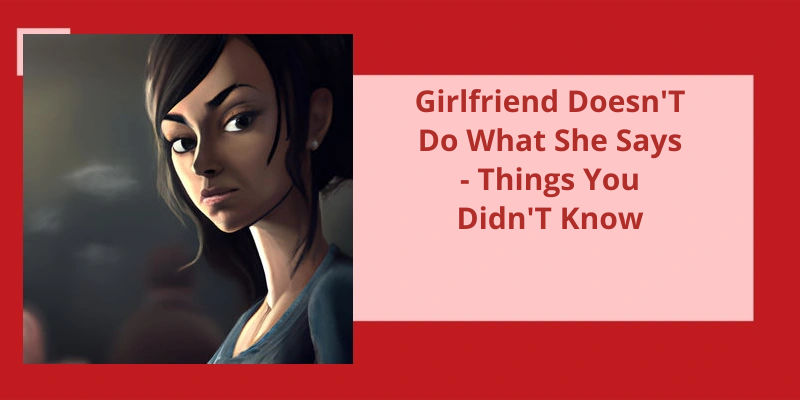As we navigate through life, we come across a diverse set of people with various personalities and behaviors. Some individuals we meet along the way may become cherished friends who uplift us and inspire us to be the best version of ourselves. However, there are instances where we may encounter disrespectful female friends who negatively impact our lives. These individuals may exhibit behaviors that belittle and disrespect us, constantly putting us down and making us feel inferior. It can be challenging to decipher how to handle these friends while maintaining our self-respect and dignity. Thus, it’s essential to understand the signs of disrespectful female friends to identify and rectify the situation before it gets out of hand.
Is It Beneficial to Have Female Friends?
Having female friends can also offer emotional support, advice and a sense of belonging. Women are more likely to discuss personal and sensitive matters with their female friends, and this can be a great way to alleviate stress and anxiety. Female friends can provide different perspectives on issues and challenges, and this can be invaluable in making better decisions.
In addition, female friends can also provide networking opportunities and career support. Women in the workplace may face specific challenges that male colleagues do not, and having a supportive network of female friends can help navigate these challenges.
Having female friends can also be beneficial for physical health. Studies have shown that women who maintain close friendships with other women have lower blood pressure, a stronger immune system and are less likely to develop heart disease. Friendship and social connections have also been linked to a longer lifespan.
It can be difficult to navigate a disrespectful conversation with a friend. However, it’s important to communicate your values without attacking your friend’s behavior. By approaching the situation with empathy and a commitment to mutual respect, you can foster a healthier relationship.
What Do You Say to a Friend Who Disrespects You?
In situations where a friend has disrespected you, it can be challenging to find the right words to express how you feel without accusing them of being disrespectful. It’s important to let them know that you value their friendship and that you don’t want to be treated in a disrespectful manner. By starting the conversation with a positive tone, you can reduce the risk of causing further damage to the relationship.
It’s also important to acknowledge that everyone makes mistakes, and it’s possible that your friend may not have realized that they were being disrespectful. By approaching them from a place of love and understanding, you can help them to better understand your boundaries and avoid future incidents that could potentially harm your friendship.
When you’ve a conversation with your friend about their behavior, it’s important to be clear and direct, but also compassionate. Avoid using accusatory language that could make them feel defensive or attack their character. Instead, focus on how their actions made you feel and how you can work together to improve your communication and mutual respect.
It can be helpful to listen to their perspective as well, as they may have a different understanding of the situation or have felt disrespected themselves. By opening up a dialogue, you can work together to create stronger boundaries and a more positive relationship moving forward.
By focusing on your own feelings and needs, as well as committing to mutual respect and open communication, you can build a stronger, more meaningful friendship in the long run.
It’s imperative to understand that disrespect only leads to a vicious cycle of negativity and toxicity. No one deserves to be treated with disrespect, and it shouldn’t be tolerated under any circumstances. In this article, we will explore the effects of disrespect and effective ways to handle disrespectful individuals.
Are You Supposed to Tolerate Disrespect?
It’s important to understand that no one is entitled to disrespect, and it shouldn’t be tolerated under any circumstance. Disrespect can range from being rude and abusive to crossing boundaries of privacy and personal space. It can also manifest in various forms like verbal harassment, mocking, mistreatment, or discrimination.
If one tolerates disrespect, they indirectly condone bad behavior and create an environment that reinforces such negativity. Tolerating disrespect may also lead to an escalation of the situation, causing harm to ones self-esteem, dignity, and well-being. It sends a message to the offender that it’s acceptable to treat people poorly, leading them to continue with their bad behavior, causing more harm to the individual and the community.
Therefore, it’s essential to speak up against disrespect and stand up for oneself and others. One needs to understand their self-worth and set boundaries for unacceptable behavior. One shouldn’t be afraid to call out the offender and demand accountability for their actions. This sends out a clear message that disrespectful behavior won’t be tolerated and stands up for those who may be passive victims.
Identifying traits of a bad friend is an essential step towards maintaining healthy relationships. While we may be quick to recognize some undesirable qualities, toxic friends can hide behind seemingly positive behaviors that are equally harmful. Aside from the five previously mentioned negative traits, there are other things that a toxic friend may do that you should be aware of.
What Are 5 Qualities of a Bad Friend?
Having a good, reliable friend is a treasure since it contributes to our overall wellbeing. A friend is someone we can share our secrets with, confide in and rely on, but not all friends provide the same benefits. A bad friend is someone who diminishes the quality of our life by causing stress or belittling us. Here are some qualities that may define a lousy friend.
One of the worst behaviors of a bad friend is putting you down. Such a friend will belittle your dreams, aspirations, or talk behind your back to lower your self-esteem. Furthermore, they may highlight your flaws or weaknesses in public to bring you down. This type of behavior causes emotional harm and damages the friendship.
A toxic friend will also regularly gossip about you or others in your inner circle. Such a friend cant maintain healthy relationships and will usually infect their friends with their negative mindset. Gossip breeds mistrust, and a lousy friend can ruin your reputation by spreading unfounded rumors or lies.
Another quality of a bad friend is apologizing without sincerity. Such a friend may not understand the harm they cause to their friends or may understand and manipulate the situation. The apology may not be genuine but be used to manipulate the person into forgiving them or not confronting them about their toxic behavior.
Feeling nervous, uneasy, or unsettled when around a friend may be a sign of toxicity. A bad friend may make you feel insecure and unable to relax around them, and you may feel better when they aren’t around.
A bad friend consistently compares you to other people or friends. This behavior can make you feel inadequate or less worthy of their company. The comparisons may include possessions, achievements, social status, or friends.
Moreover, a bad friend may put themselves front and center and always demand attention. They may not understand the concept of sharing or put your friendship bond before their selfish desires. This can also mean that they monopolize conversations, brag about their achievements or make it all about them.
These are a few qualities of a bad friend that you should look out for to avoid damaging friendships. It’s essential to create relationships that uplift and improve your life, rather than ones that may cause harm or damage your self-worth.
Source: What’re the bad qualities of a friend?..
When we feel disrespected, it’s natural to want to react emotionally, but that may not be the best course of action. Instead, it’s important to learn how to manage disrespect in a calm and measured way. Building a foundation of mutual respect is crucial, and it starts with earning respect ourselves. From there, practicing equanimity, kindness, and empathy can help us navigate difficult situations with grace and integrity. In this article, we’ll delve deeper into these techniques and explore how to put them into practice when faced with disrespect from others.
How Do You Not Tolerate Disrespect?
Respect is an essential human value that everyone deserves. It’s the foundation of all relationships, a crucial element that establishes trust, understanding, and cooperation. The significance of respect can’t be stressed enough. However, there are times when individuals don’t value respect, and they tend to disrespect others intentionally. This can lead to a lot of hurt and pain on the part of the person at the receiving end. But, how does one not tolerate disrespect?
One way of managing disrespect is by living a life above reproach. This means that you carry yourself with integrity, moral values, and principles that align with your beliefs. When you live a life that’s ethical, you can hardly go wrong. You inspire others with your actions and set the standard for how you expect to be treated. By living a life of values, you set the tone for how people should treat you.
Another way to manage disrespect is by practicing equanimity. This technique involves not reacting to disrespect with anger or violence but instead keeping a cool head. It’s often said that silence is golden, and it’s true in this case. When you don’t respond to disrespect, you show the person that their behavior is unacceptable without giving them the reaction they crave. It empowers you to stay in control of your emotions and not let them get the better of you.
Being kind and asking questions is another technique. This technique allows you to communicate with the person in a respectful manner while still addressing their behavior. Instead of lashing out, ask them why they behaved the way they did. Ensure that you do this in a non-threatening manner to avoid inflaming the situation. When you ask questions, it demonstrates that you’re genuinely interested in understanding where they’re coming from, which will help in managing their disrespect.
Taking the initiative is also an effective tool in managing disrespect. It means that you take charge of the situation and let the person know that their behavior is unacceptable. You set the boundaries of how you expect to be treated and ensure that they’re respected. Taking the initiative doesn’t mean you become confrontational or aggressive, but you address the situation assertively and with confidence.
Finally, practicing empathy when confronted with disrespect can help you manage it better. It would help if you tried to put yourself in the other persons shoes to understand why they might have behaved the way they did. It could be that they’re going through something that’s affecting their behavior, or they might not have understood the impact of their actions. When you practice empathy, you show that you care about the other persons feelings, and this can make them more receptive to your requests for respectful behavior.
Managing disrespect requires intentional effort and patience. It’s vital to stay calm and composed when dealing with disrespectful people while still being firm and assertive. Using the techniques outlined above, such as living a life above reproach, practicing equanimity, being kind and asking questions, taking the initiative, and practicing empathy, can help maintain a respectful relationship with those around you. Remember, respect is earned, and it’s up to all of us to ensure that we treat each other with dignity and reverence, no matter our differences.
How to Identify Signs of Disrespect
- Interrupting or talking over someone
- Ignoring or dismissing someone’s ideas or opinions
- Using a condescending tone
- Belittling or mocking someone
- Talking about someone behind their back
- Disregarding personal boundaries
- Blaming and attacking rather than listening and understanding
- Refusing to apologize or take responsibility for one’s actions
- Dismissing someone’s emotions or feelings
- Using insulting or derogatory language
Conclusion
It’s important to recognize these behaviors and address them in a constructive way to maintain healthy and functional relationships. It’s also crucial to set personal boundaries and communicate them clearly to avoid further disrespect. Remember that value and respect are essential in any relationship, and it’s okay to take a step back or cut ties with those who continuously display disrespectful behavior. Ultimately, always prioritize your well-being and surround yourself with those who lift you up and support you in a positive way.






